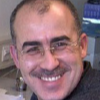
Mustapha Djeddou
Work place: Communication systems laboratory, Ecole Militaire polytechnique, BP 17, Bordj El Bahri, 16111, Algiers, Algeria
E-mail: c.lab.sc_emp@mdn.dz
Website:
Research Interests: Digital Library
Biography
Mustapha Djeddou was born in Bejaia, Algeria, in 1967. Received his MS in 1998 and his PhD with the highest honor in electrical engineering in 2005, both from the National Polytechnic School, Algiers.
Currently, he is the head of the Communication Systems Laboratory at the Military Polytechnic School, Algiers.
His research interests include biometrics, statistical signal processing, applied signal processing for digital communication, and wireless communication.
Author Articles
Interference Rejection in FH/BFSK System Using Blind Source Separation
By Rafik Guellil Hadj Abd El Kader Benzater Mustapha Djeddou
DOI: https://doi.org/10.5815/ijitcs.2016.10.06, Pub. Date: 8 Oct. 2016
This paper introduces a new approach based on blind source separation (BSS) to mitigate intentional interference in BFSK digital communication systems using frequency hopping spread spectrum technique. The use of BSS is possible thanks to adopting an adequate selection block to distinguish between the useful signal and other undesirable signals, hence, circumvent the problem of ambiguity of permutation. An analytical calculation of the probability of error to predict the performance is done. The simulation results showed the effectiveness of this approach, whatever the level of the JSR and without using the fast frequency hopping alternative or error-correcting codes.
[...] Read more.Real Time Implementation of Audio Source Localization on Blackfin ADSP-BF527 EZ-KIT
By Mustapha Djeddou Anis Redjimi Abdesslam Bouyeda
DOI: https://doi.org/10.5815/ijitcs.2012.07.02, Pub. Date: 8 Jul. 2012
The present paper discusses the implementation of direction of arrival estimation using Incoherent Wideband Music algorithm. The direction of arrival of an audio source is estimated using two microphones plugged in “Line-in” input of a DSP development board. A solution to the problem of fluctuating estimation of the angle of arrival has been proposed. The solution consists on adding an audio activity detector before going on processing. Only voiced sound frames are considered as they fulfill the theoretical constraint of the used estimation technique. Furthermore, the latter operation is followed by integration over few frames. Only two sensors are used. For such a reduced number of sensors, the obtained results are promising.
[...] Read more.Other Articles
Subscribe to receive issue release notifications and newsletters from MECS Press journals